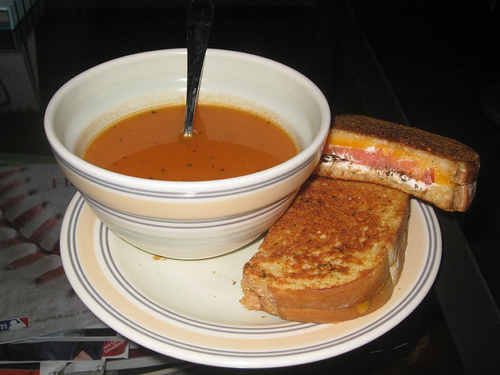Gratitude is the antidote to the two things that stop us: fear and anger. – Tony Robbins and here

You can be angry about being sick. You can be afraid of how sick you are. Or you can be grateful for a warm bowl of soup and a sandwich. I’d be grateful. How about you?
What does that mean?
The more complete quote is “Gratitude is the antidote to the two things that stop us: fear and anger. Fear is why we don’t take action and anger is why we get stuck. You can’t be grateful and angry simultaneously. You can’t be fearful and be grateful simultaneously. So it’s really the reset button.”
That sounds pretty straight forward, doesn’t it? Can you remember a time when you had a heart full of gratitude, but were afraid? The one will drive out the other, as they are natural antagonists. The same goes for having a heart full of gratitude and being angry. You can’t be both at the same time.
By choosing gratitude, we can push these unhelpful emotions to the margins and allow ourselves to get back in the game, to take action, to become unstuck. That is why he called it the antidote, because that is really what it can do, provided you can find a way to be grateful.
Why is being able to show gratitude important?
Think about it for a moment. Being angry, that is. You don’t have to get really angry, just a little will suffice. Now think of something for which you are grateful. Really concentrate on the gratitude for a moment, then try to find the anger. Was it the same, or had the gratitude diminished it?
Think about something scary or unknown, something that makes you at least a little apprehensive, if not fearful. It doesn’t have to be ‘hide under the covers’ scary, just something uncomfortable. Now go back to being grateful for a few moments. What happened to the fear? Is yours the same? Mine was diminished.
How useful would being able to do something that significantly diminished the anger and fear in your life? Gratitude can do that, as I hope you just discovered. How much more effective do you think it would it be if you were to make gratitude a normal part of your day? I believe it would be useful.
Where can I apply this in my life?
I would imagine that gratitude would be most useful whenever or wherever you find fear or anger encroaching into your life. I imagine it is useful in almost any other situation as well. But it will be most beneficial in those situations where you want to limit or banish fear and anger.
Fear, it is said, is the mind-killer. It paralyzes us. It keeps us from doing what we should, because we have fear. Whether it’s fear of failure, fear of success, fear of consequences, fear of the unknown, or some other fear, where fear is, there is rarely any useful action. Screaming and running away are rarely useful actions, right?
While gratitude won’t remove risk, it can help us to see that there is something useful, even beneficial, to any outcome. Rather than fearing action, we can begin to embrace it. And in that embrace, we begin to start moving, and once again, we can take action.
Anger causes us to become stranded in a pattern, stuck in a loop. Whether it’s a pity party or raging against a person or group, while anger rages, we are at it’s mercy. And anger has no mercy. In extreme cases, we can even act out, although most of us just sit quietly and stew in our own anger.
That sounds really productive, doesn’t it? No, I didn’t think so. Gratitude may not take away the offense or the hurt which caused the anger in the first place, it does make an excellent salve for the wound. As the hurt diminishes, the anger tends to drain away. While it may not be eliminated completely, it should recede sufficiently to allow us to break free from our unproductive pattern.
Think back in your life and see if you can spot times when you have been in those situations, and found gratitude as a way of helping yourself. I wasn’t sure until I really started digging. But I found a few examples. Why is that important?
It is important because it’s one thing for me to say it, but another thing entirely for you to have experienced it. That makes it a bit more real, and vastly more believable. If you can’t find an instance in your past, promise yourself to try this the next time you find yourself fearful or angry.
He goes on to say that when you are being gracious, you are no longer centered on yourself. The implication is that you cease to be an obstacle to your ability to see others, their needs, and their pain. Think about how that could also change your life.
Gratitude is the gift that keeps on giving. It helps us get past the worst in ourselves, and opens us up more completely to the needs of others. To me, that makes it a very valuable skill indeed! Be grateful for anything and everything, all the time. Don’t let anger or fear get a chance to start!
Could you write down a little something each and every day for a week, a month, perhaps even a year? For what are you grateful?
From: Twitter, @tonyrobbins
confirmed at : in this 5 min Video clip at 1:40 (as well as elsewhere on the web)
Photo by BluEyedA73







Pingback: IT projects: fear is everywhere | CGB Consulting
Excellent goods from you, man. I’ve understand your stuff previous to and you are just extremely excellent. I actually like what you’ve acquired here, certainly like what you are stating and the way in which you say it. You make it enjoyable and you still take care of to keep it smart. I can’t wait to read far more from you. This is actually a great site.
Thanks for the kind words. I’m glad you found this of some use.
Pingback: A Radically Functional Approach to Gratitude, Fear, and Commitment | power of language blog: partnering with reality by JR Fibonacci
Your sandwich looks delish
Thanks, but it’s not my sandwich. The photo credit is at the bottom of the post. Glad you stopped by, and I hope you found something useful, besides the munchies for the sandwich. 8)
Pingback: Gratitude, Fear, and Courage: Arch-Enemies or Allies? | power of language blog: partnering with reality by JR Fibonacci